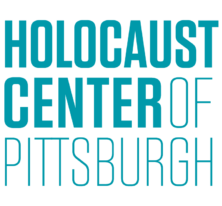
Profile by Adam Bossers
The Bible commands that we love our neighbor as ourselves, and in a time when people choose to hate rather than love, it can be difficult to find those who truly care, especially for the victims, friends and families who experienced loss during the attack on three Pittsburgh Jewish congregations.
Loss is difficult for any person to come to terms with, especially for the victims of this tragedy; however, therapist Megan Cook has done whatever she can to lighten their load, which is why she has been nominated as a Righteous Among the Neighbors recipient.
Growing up in a Catholic family, “love thy neighbor” is something that Megan Cook was taught to live by. Now, it’s something she applies to her work as a therapist too.
Cook has been seeing clients since 2014 and believes that despite the personal pressures of helping so many victims it’s an “honor and a privilege” to lighten the load.
“It’s kind of this double-edged sword in that it can be really heavy but it can also be really an honor and a privilege,” she said. “Knowing that I am going to be one of the people in victims or witnesses or whomever’s life that is going to have the honor and privilege of holding their story and getting to hear that is one way I handle it.”
She also makes a point to create a space where “each person can explore themselves and work to reach their potential.”
“Regardless of race, religion, ethnicity, sexual orientation, gender identity, to me, everyone has a right to those spaces whether that’s therapy space or whether that’s worship space,” she said.
Since the attack, Cook has been working with the 10.27 Healing Partnership, a non-profit that came after the attack on the three Pittsburgh Jewish congregations. Aside from her profession, she believes it’s her duty as a human to advocate and stand up against hate.
“I think it’s my duty as a neighbor, I think it’s my duty as a therapist, I think it is my duty as a member of the human race,” she said. “I do now have almost a five-year relationship with people within the Jewish community. They’ve become friends, and they’ve become people that I love and care about. And I probably would say that they were people I loved and cared about even before a personal relationship.”
Growing up in a mostly Catholic neighborhood, Cook admitted she never knew many practicing Jewish people and before working with Pittsburgh’s Jewish community considered the Jewish culture “exclusive.”
“Before working with the Jewish community, I never had the notion that the Jewish community was, you know, cold or wouldn’t reach out or connect, but it always felt insular,” she said. “To me, that was just the opposite of my experience.”
Admitting her own previous ignorance, Cook now wishes she had been more curious.
“In working with the Jewish community for the past five years, I wish that I had been more curious and more pursuant of connection,” she said. “I think that part of fighting hate and fighting antisemitism is curiosity and open-mindedness and kind of this loving way of wanting to get to know someone different, and all the different ways to be human and to be religious and to be secular and to be a Pittsburgher.”
Now having that nearly five-year connection, she believes that it has “humbled her” and made a significant positive impact on her life.
“I think it has made me feel a genuine part of Pittsburgh,” she said. “It’s definitely created relationships and connections that I cherish and honor and I’m just in awe of. It has made me aware of and grateful for the support of many Pittsburghers from the Muslim community, to the Red Cross, to the mental health agencies, to the first responders, to the Jewish community and anyone in between that.”
Additionally, due to working with the Jewish community, Cook believes her resolve to stand up against oppression has strengthened.
“It has shown me what connection and being there for other people [can do], the power of that, and the beauty of it,” she said. “On top of that, the absolute sacred poignancy of those types of relationships, is, I think, the biggest positive impact.”
To Cook, speaking out against oppression and hatred is bigger than just one person or one relationship because it has always led her to a positive place.
“Think if you can speak up, even if you’re nervous, even if your hands are shaking, if it’s safe,” she said. “There’s something to be said for being vocal about hate and standing up for the rights and dignity and respect that other people are entitled to and are deserving of. I would rather stand up for what I believe in and stand up for the rights of others than keep a friend or two who is hateful, who is prejudiced, who is racist, who is antisemitic. It has in my experience always been worth it because it always leads to love and it always leads to kindness.”
